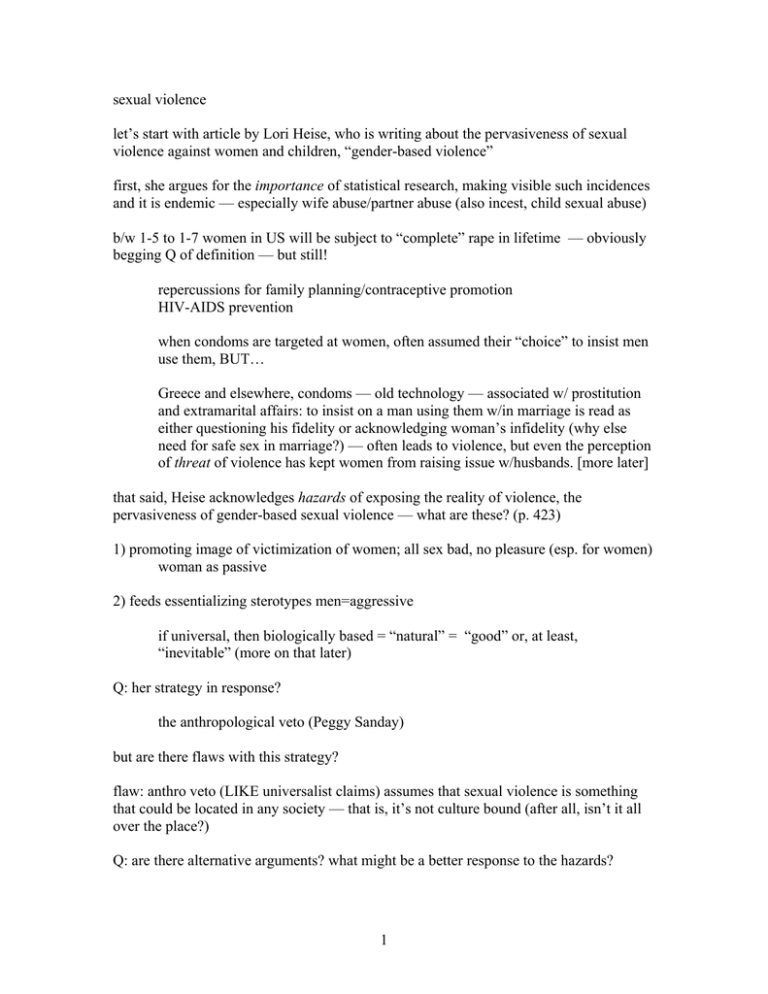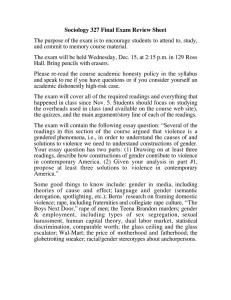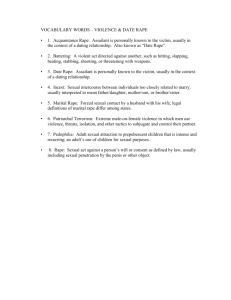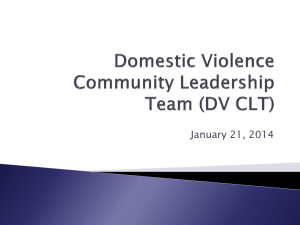
sexual violence
let’s start with article by Lori Heise, who is writing about the pervasiveness of sexual
violence against women and children, “gender-based violence”
first, she argues for the importance of statistical research, making visible such incidences
and it is endemic — especially wife abuse/partner abuse (also incest, child sexual abuse)
b/w 1-5 to 1-7 women in US will be subject to “complete” rape in lifetime — obviously
begging Q of definition — but still!
repercussions for family planning/contraceptive promotion
HIV-AIDS prevention
when condoms are targeted at women, often assumed their “choice” to insist men
use them, BUT…
Greece and elsewhere, condoms — old technology — associated w/ prostitution
and extramarital affairs: to insist on a man using them w/in marriage is read as
either questioning his fidelity or acknowledging woman’s infidelity (why else
need for safe sex in marriage?) — often leads to violence, but even the perception
of threat of violence has kept women from raising issue w/husbands. [more later]
that said, Heise acknowledges hazards of exposing the reality of violence, the
pervasiveness of gender-based sexual violence — what are these? (p. 423)
1) promoting image of victimization of women; all sex bad, no pleasure (esp. for women)
woman as passive
2) feeds essentializing sterotypes men=aggressive
if universal, then biologically based = “natural” = “good” or, at least,
“inevitable” (more on that later)
Q: her strategy in response?
the anthropological veto (Peggy Sanday)
but are there flaws with this strategy?
flaw: anthro veto (LIKE universalist claims) assumes that sexual violence is something
that could be located in any society — that is, it’s not culture bound (after all, isn’t it all
over the place?)
Q: are there alternative arguments? what might be a better response to the hazards?
1
ask: are these characterizations of violence actually the same thing everywhere?
1st, think about the question, why does violence (in general) occur?
myriad of reasons — revenge, fear, hatred, misunderstanding, marking difference,
conquest, political ends, material gain
why does sexual violence occur?
it’s striking how many theories focus on a single cause, assume universality of
occurrence and meaning
ex: it’s a natural outcome of male sexuality [active, aggressive] (e.g., A Natural
History of Rape: The Biological Basis of Sexual Coersion = men rape when the
costs are low and they can get away with it b/c it’s a byproduct of evolutionary
biology and reproductive success)
note: so much of technology, social “progress” is directed at modifying,
controlling nature, it’s interesting that nature seems suddenly “uncontrollable”
when it comes to socially contentious issues
flip side:
constructivist argument:
it’s a political outcome of socially constructed male sexuality (men rape because
they are taught they are naturally aggressive, it bolsters their masculinity)
thus Heise: “it is partly men’s insecurity about their masculinity that promotes
abusive behavior towards women”
feminist activist mantra: rape isn’t about sex, it’s about power
what do you make of this position, Heise’s analysis generally? criticisms?
overgeneralizations may undermine political-moral efforts to eradicate violence
a better way to think about the pervasiveness of sexual violence might be to look at
HISTORY and cultural context
militarized mass rape
“gender-based” violence is also often race/ethnicity-based or religion-based
rape, as di Leonardo points out, is rarely if ever just an act between a man (generically
speaking) and a woman (generically speaking) — but b/w white man and black woman,
or Serb man and Croat woman — specificity is important
reducing rape to something boils down to man v. woman has hampered theorizing
2
sexual violence (including thinking sexual abuse of males)
rape in/after American slavery
what did you make of Di Leonardo’s essay?
can’t analyze away our subjective experience
“knowledge does not necessarily command emotion”
fear is shaped by cultural forces — myths, stereotypes — we don’t always have
analytical command over — or at least not until after the fact of initial flood of
adreinaline
conversely, “individual experiences shouldn’t change well-thought-out-opinions” — at
least not necessarily — like Foucault refusing to theorize from his personal belief about
the source of homosexual desire in individuals
pitfalls of “identity politics,” appropriateness of “speaking from experience”
how should we move back and forth between social science analysis and personal
experience? when is one relevant to the other?
(pedagogical challenge)
importance of attending to personal experience
importance of not eliding personal experience and social analysis
3
MIT OpenCourseWare
http://ocw.mit.edu
21A.231J / WGS.455J Identity and Difference
Spring 2006
For information about citing these materials or our Terms of Use, visit: http://ocw.mit.edu/terms.






